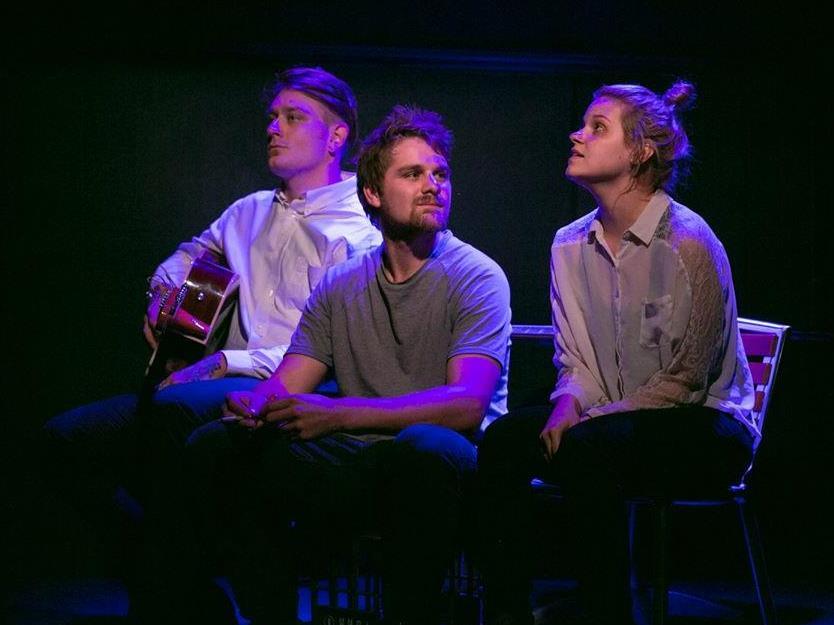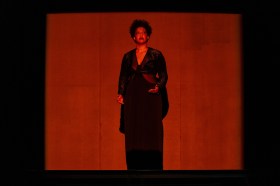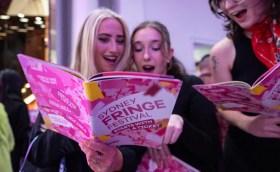Photo by Jamie Breen
Writer Shakara Walley takes us to a desert community, far from Perth in the red dust and heat. Brooke is immersed in her life, a local girl making the most of singing in the pub and doing shows on the local radio station. One night, her audience includes Leon, returned from Perth, and they talk, catch up, with the echoes of an absent friend filling the pauses in their conversation. Years of separation have not healed the guilt, grief and bewilderment that marked their parting, her brother’s death that broke up their youthful gang.
The Blue Room Theatre does not boast large performance spaces, and director Ian Wilkes has gone against the grain by further limiting his actors by seating the audience at small, cabaret-style tables and running the performance in the margins of space left along two walls. Set designer Patrick Howe rises to the challenge and his response of creating the feel of being a fellow pub patron heightens the sense of intimacy, a sense of immediacy in witnessing this reunion of two long lost friends. The switches between the present and the memories of their youthful hijinks, secrets and disagreements are smoothly effected, every part tightly performed and with no place for any performer to hide from close audience scrutiny and engagement.
Beth Cooper plays Brooke, bringing steely determination to her modern-day character, and earnestness to her youthful flashbacks. While some of her lines are a little too wordy, Cooper is immersed in her character’s changes in mood. Mike’s memory is brought to tempestuous life by Zac James, playing the volatile, energetic brother and friend with physical accuracy. He dominates the scenes of stargazing, playing footy and general mucking around, but haunts the fringes of action as an opinionated ghost as the other two characters reminisce about him. James Taylor is a hopeful Leon, looking for direction in life and searching his past for guidance. Taylor awakens Leon’s strong memories and simple hopes of being able to return to past happiness with subtly changing facial expressions. Cooper and Taylor develop, destroy and re-develop a chemistry between their characters, with James’ Mike a consistent force in their lives.
Ashlee Poole’s lighting design makes the most of the tightly limited performance space, creating distinct staging areas within the marginal layout. Howe’s use of raised sections of stage allows some musical performances to be particularly effective, but overall Mike Podmore’s sound design works with the unfolding narrative, memories and revelations to heighten the emotional impact of the work.
Walley is well-known in Perth, and both her name’s familiarity and the tightness of this script add to the surprise that she has not ventured into playwriting previously. She perceptively foregrounds emotional intensity and character identity, embedding the narrative in contemporary issues to ensure intelligent credibility. Worth watching at any time of year, Songbird is a welcome addition to the NAIDOC Week celebrations.
Rating: 3 ½ stars out of 5
Songbird
Presented by The Blue Room Theatre and Imprint Productions in association with Yirra Yaakin Theatre Company
Writer / Producer: Shakara Walley
Director: Ian Wilkes
Set Designer: Patrick Howe
Lighting Designer: Ashlee Poole
Sound Designer: Mike Podmore
Stage Manager: Rebecca Davidse
Performed by Bethany Cooper, James Taylor and Zac James
The Blue Room Theatre, Perth Cultural Centre, Northbridge
7 – 18 July 2015






